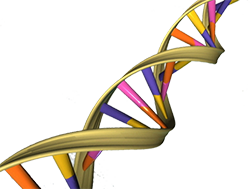
Yesterday I launched my newest research guide, on using DNA for genealogical research.
About My Librarian Work
I am the Marketing & Systems Librarian for Pollak Library at California State University, Fullerton, but I am also their genealogy specialist. Because our library’s primary mission focuses on research in support of curriculum, we do not have an official genealogy collection or staff. However, fostering lifelong learning is a secondary mission.
I have been able to use my faculty professional development funds to attend the RootsTech conference last year, the RootsTech and Federation of Genealogical Societies (FGS) combo conference this past February, and I will use the last of my allotment for this fiscal year by attending the Southern California Genealogy Jamboree this coming June. My session attendance at the February conferences focused heavily on genetic genealogy, as will my selected sessions at Jamboree, particularly the dedicated DNA Day.
In return for using these professional development funds, library faculty are encouraged to share what we learned with our colleagues and campus. This research guide — built on our LibGuides system — is part of that fulfillment. A colleague and I are also planning to launch a series of genetic genealogy Brown Bag sessions through our library, and are discussing hosting an interdisciplinary seminar next year that would hopefully include faculty experts from our biology, anthropology, and criminal justice departments.
About the Guide
The research guide is by no means complete. I am still scrambling to add more material, and will continue to regularly update it. It is meant to be comprehensive, but not exhaustive. To assist repeat visitors with identifying new material, I have a section on the home page where I note what has been most recently added.

My job here is to mostly find, review, and curate good material written and produced by others with far more expertise than I have in this field. Sources are always attributed.
Video Tutorials
Be sure to check out the library of Video Tutorials and the library of Readings (blog posts, scholarly and popular articles, and eventually some books). There are so many videos and articles out there on the interwebs about DNA and genealogy, however I have personally reviewed and hand-picked good still-current ones from authoritative sources. As new quality videos and readings come to my attention, they will get added.

Special Sections for Different Audiences
Because figuring out how and where to start can be overwhelming to those new to using DNA for genealogy, I have built out a special section for different Audiences — which includes a page for Beginners. This section includes learning materials from throughout the guide, but repackaged in one spot easily accessible to those with different levels of experience, as well as those with particular interests such as an academic focus or unknown parentage. Aside from the Beginner area, this section is still very much under construction.
HT to fellow tech and DNA nerd Randy Whited for bringing up the idea of Beginner “Intro” resources after he took an initial sneak peak at the guide a couple days ago.

Giving Credit Where Credit is Due
Despite investing so much of my personal time and dime to this field right now, I am still quite new to using DNA with my research. Although I first tested my dad in early 2014, I did not start learning what to do with that test until after RootsTech/FGS this year. Since those February conferences, I have jumped head-first into rapidly learning all I can about this exciting emerging field, including recently starting to investigate my birth family. You can follow my own DNA adventures on my family history blog.
I have my friend molecular genealogist Angie Bush, MS to thank for much of that. Her educational and professional background as a scientist, combined with her decades of experience doing traditional genealogy, allows Angie to explain the complex science and probabilities of this field in terms that even those of us who don’t recall one iota from intro biology class can understand. She is an exceptional teacher, speaker, and consultant.
Others to thank include: the ever fabulous Legal Genealogist, Judy G. Russell, JD, CG, CGL for keeping me mindful about the ethics of DNA testing; DearMYRTLE Pat Richley-Erickson for her excellent current series of Google Hangouts with Angie on Demystifying DNA Tests, which is featured throughout this guide; and scientist, genealogist, and Hoosier Daddy? author Michael Lacopo for sucking me into his genetic genealogy page-turning saga, while teaching me about autosomal DNA analysis at the same time.
Suggestions or Requests?
Do you have suggestions for additional sources or information to add? Feedback on how to better organize this material? Any special requests about what you want to learn?
Please use the Comments below, email me at colleen dot e dot greene at gmail dot com, or Connect with Me (see sidebar) online through one of our mutual networks.
Follow my professional Facebook Page , which is packed with tips, collections, events, and news personally recommended by me. I scour the web for great information for you. See you on Facebook today!